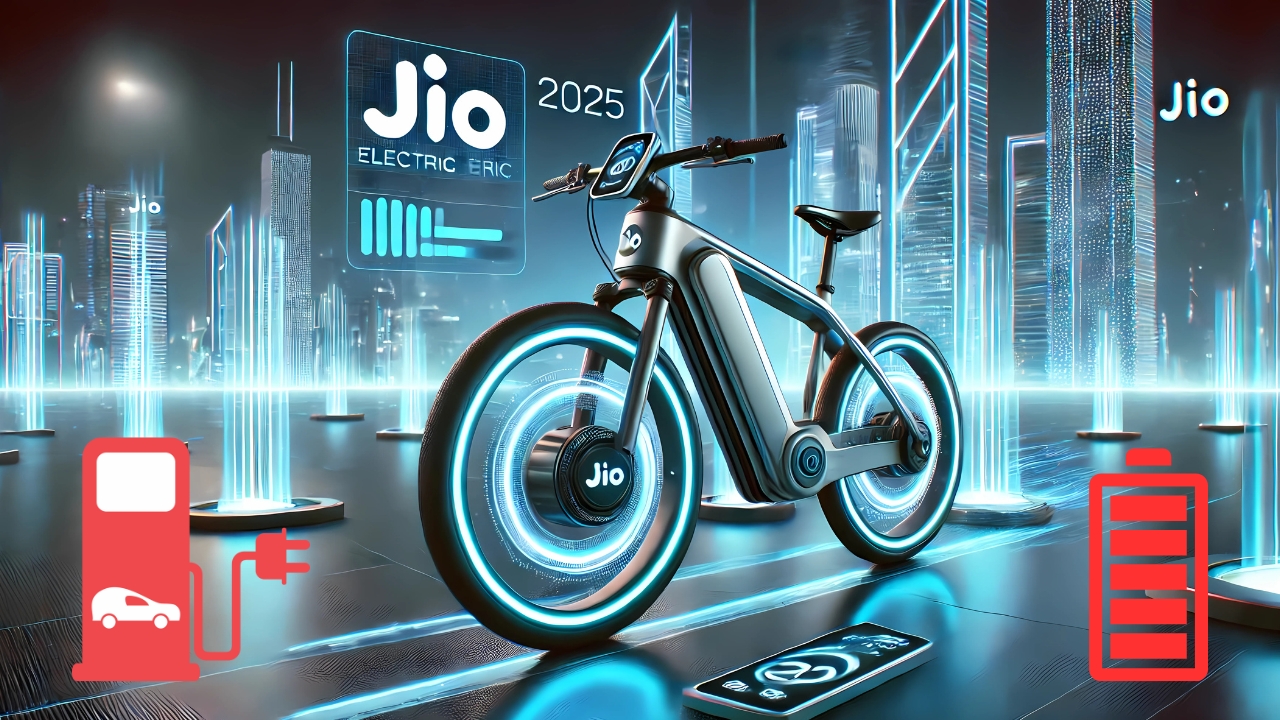Jio’s Electric Cycle: India’s transportation landscape is undergoing a seismic shift, with electric vehicles (EVs) leading the charge toward sustainable and affordable mobility. At the forefront of this revolution is Reliance Jio, a company synonymous with disrupting markets through innovation and affordability.
Known for transforming India’s telecom sector, Jio is now poised to make waves in the electric vehicle industry with its much-anticipated Jio Electric Cycle. This groundbreaking e-cycle, rumored to offer an unprecedented 400 km range on a single charge, has sparked excitement and skepticism alike. If these claims hold true, Jio’s electric cycle could set a new global benchmark, redefining what’s possible in the world of electric two-wheelers.
This article explores the potential of Jio’s electric cycle, its features, implications for the market, and the challenges of achieving such an ambitious range, all while keeping an eye on its promise to transform urban and rural commuting.
A Game-Changer in Electric Mobility
The Jio Electric Cycle is generating buzz for its bold promise: a 400 km range at an estimated price of ₹30,000 to ₹60,000, making it a compelling option for students, urban commuters, and eco-conscious riders. Unlike traditional bicycles or even existing e-cycles, Jio’s offering is designed to combine affordability, advanced technology, and sustainability.
Reports suggest it features a high-capacity, removable lithium-ion battery and a 250W brushless DC motor, delivering a top speed of 25 km/h, which aligns with India’s legal limit for license-free electric vehicles. This balance of performance and compliance makes it an attractive choice for daily commuters navigating congested city streets or rural pathways.
The cycle’s lightweight aluminum alloy frame ensures durability and portability, allowing riders to maneuver through tight urban spaces or carry it indoors for storage. Additional features, such as GPS tracking, premium lighting, and anti-theft systems in higher-end variants, position the Jio Electric Cycle as a tech-savvy, practical solution for modern mobility needs.
Priced competitively, with base models starting at approximately ₹29,999 and premium variants reaching up to ₹39,999, Jio aims to democratize electric mobility, much like it did with telecom services.
The 400 km Range Claim: Feasible or Hype?
The standout feature of the Jio Electric Cycle is its reported 400 km range, a figure that, if verified, would surpass most electric bicycles and even rival some electric cars. This claim has sparked both excitement and skepticism. Industry experts question the feasibility of such a range at the rumored price point, given the technical and cost-related challenges. Most e-cycles in the market, like those from Hero Lectro or Ninety One Cycles, offer ranges between 40–100 km, making Jio’s claim seem almost revolutionary.
Achieving a 400 km range would require significant advancements in battery technology. The cycle is said to be powered by a high-capacity lithium-ion battery, known for its efficiency and durability. However, to deliver such an extended range, the battery would need to be exceptionally energy-dense, possibly incorporating cutting-edge materials or designs not yet common in budget-friendly e-cycles. Factors like rider weight, terrain, weather, and usage patterns (e.g., pedal-assist vs. full-throttle mode) also affect range, and Jio’s claim likely assumes optimal conditions. Some sources, such as Patrika Times, have reported a more conservative range of 80 km for certain models, suggesting that the 400 km figure might apply to specific variants or idealized scenarios.
Despite the skepticism, Jio’s track record of disrupting markets lends credibility to its ambitions. The company’s ability to leverage economies of scale, as seen in its telecom ventures, could enable it to produce high-performance batteries at lower costs. Partnerships with technology providers or innovations in battery management systems could further bridge the gap between ambition and reality. If Jio delivers even 75% of the promised range, as suggested by some industry analysts, it would still set a new standard for e-cycles.
Features Tailored for Indian Riders
The Jio Electric Cycle is designed with India’s diverse commuting needs in mind. Its 250W motor provides smooth torque and efficient power, ideal for navigating crowded urban streets or uneven rural roads. The cycle’s top speed of 25 km/h ensures compliance with India’s regulations, eliminating the need for a license or registration, which is a significant advantage for students and young professionals. The removable battery allows for easy charging, whether at home, work, or public charging stations, addressing a common pain point for EV users.
The cycle’s aluminum frame is both sturdy and lightweight, making it easy to carry into apartments or store in compact spaces. Higher-end variants are expected to include smart features like GPS tracking for navigation and security, premium LED lighting for night rides, and anti-theft systems to protect the investment. These features cater to tech-savvy users who value convenience and connectivity. Additionally, the cycle’s low maintenance requirements, due to fewer moving parts compared to traditional vehicles, promise cost savings over time, appealing to budget-conscious consumers.
Impact on India’s Electric Vehicle Market
Jio’s entry into the electric cycle market could have far-reaching implications. India’s EV sector is growing rapidly, driven by rising fuel prices, environmental awareness, and government incentives for clean energy. However, high costs and limited infrastructure have kept electric vehicles out of reach for many. Jio’s e-cycle, with its rumored affordability and impressive range, could bridge this gap, making electric mobility accessible to a broader demographic, including students, small business owners, and rural commuters.
By challenging established players like Hero Lectro and Avon, Jio could disrupt the e-cycle market, much like it did with telecom. Its pricing strategy—offering high-value features at a fraction of the cost of competitors—could force other manufacturers to innovate or lower prices. Moreover, Jio’s extensive distribution network and brand recognition could accelerate adoption, particularly in smaller towns and rural areas where eco-friendly transport options are scarce.
The cycle’s potential to reduce carbon emissions aligns with India’s sustainability goals. With urban air pollution reaching critical levels, affordable e-cycles could encourage a shift away from fossil fuel-powered vehicles, contributing to cleaner cities. For rural users, the 400 km range (if achieved) could transform access to markets, schools, and healthcare facilities, fostering economic and social mobility.
Challenges and Skepticism
Despite the excitement, several challenges remain. The lack of an official announcement from Jio raises questions about the cycle’s specifications and launch timeline. Reports suggest a launch by the end of 2025, but without confirmation, the 400 km range and ₹30,000 price point remain speculative. Technical hurdles, such as battery size, weight, and charging infrastructure, could limit the cycle’s practicality. A battery capable of delivering 400 km would likely be large and heavy, potentially compromising the cycle’s portability and affordability.
Skeptics also point to the competitive landscape. Established brands like Hero and Avon have years of experience in the cycle market, and new entrants like Raptee.HV and Bad Boy are pushing boundaries with high-performance electric vehicles. Jio will need to balance innovation with reliability to stand out. Additionally, India’s uneven road infrastructure and limited charging networks could pose challenges for widespread adoption, particularly in rural areas.
The Road Ahead
The Jio Electric Cycle represents a bold step toward sustainable, affordable mobility. If Jio delivers on its promise of a 400 km range, it could set a new world record for e-cycles, redefining expectations for range and performance in the budget segment. Even if the final product falls short of this ambitious claim, Jio’s history of market disruption suggests it will offer a competitive, feature-rich option that appeals to a wide audience.
As India embraces electric mobility, Jio’s e-cycle could empower millions with a cost-effective, eco-friendly alternative to traditional transport. Whether it’s a student commuting to college, a professional navigating city traffic, or a rural resident accessing distant markets, the Jio Electric Cycle has the potential to transform lives. For now, the industry and consumers alike await official confirmation, but the anticipation is palpable. Jio’s track record suggests that when it enters a market, it doesn’t just compete—it redefines the game.

